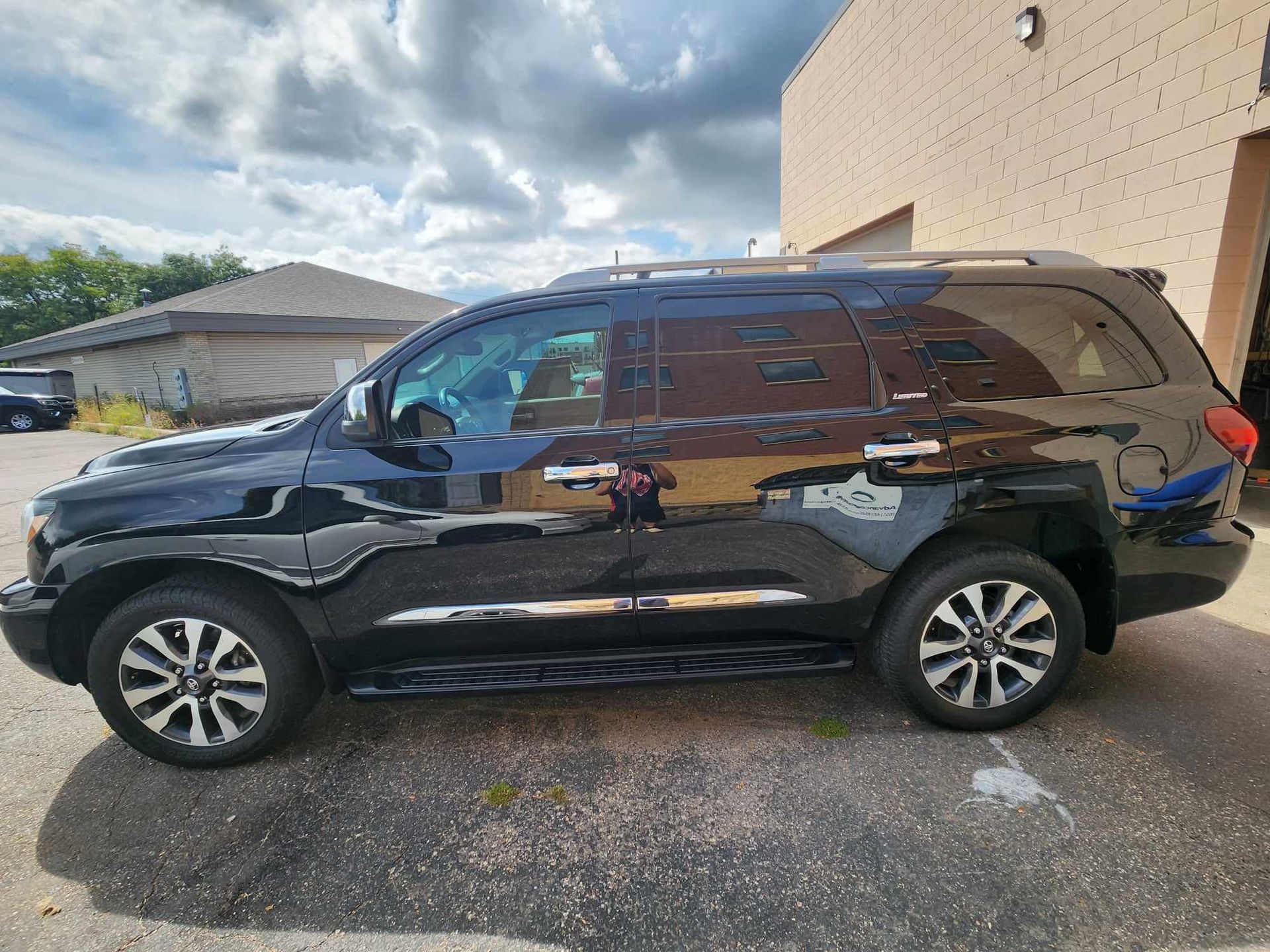Can Auto Detailing Remove Scratches From Your Car?
Few things are more frustrating than finding a new scratch on your vehicle. Even light marks can age your paintwork and dull the finish. But can auto detailing remove scratches, or is repainting required? The answer depends on the depth of the scratch and the detailing techniques used. Let’s break it down.
Key Takeaways
- Scratches often come from daily use, like car washes and debris.
- Detailing removes light to moderate scratches on the clear coat or paint.
- Deep scratches need repainting, not just buffing or polishing.
- Paint protection film (PPF) and ceramic coatings guard the paint after correction.
- Pro detailing offers better results than DIY kits.

What Causes Scratches On A Car’s Surface?
Most scratches come from routine activities. Automatic car washes, tree branches, flying debris, or wiping a dusty surface all lead to surface damage. Parking near bushes or brushing against walls can also leave visible scratches on the paint. Friction, impact, or abrasive materials often leave swirl marks or etch the clear coat.
What Are Some Types Of Car Scratches?
Scratches affect different layers of the vehicle’s finish. The depth determines whether auto detailing can remove the damage.
- Clear coat scratches: Light defects remain on the surface layer, often caused by towel marks, swirl patterns, or automated car washes.
- Paint layer scratches: Damage reaches into the base color layer and typically requires machine compounding followed by polishing to remove.
- Primer or metal scratches: Deeper cuts expose the primer or bare metal underneath, which usually calls for repainting or body panel repair.
Can Auto Detailing Remove Scratches?
Yes. Auto detailing can remove scratches,
but only if the damage remains within the clear coat or color layer. Shallow and medium-depth marks respond well to polishing and compounding, key techniques used in
professional car detailing.
How Does Auto Detailing Remove Scratches?
The scratch removal process involves several techniques. Each step plays a role in smoothing the surface and restoring clarity to the paint.
Step 1: Polishing
Polishing removes surface scratches using fine abrasives that refine the clear coat. This process eliminates swirl marks and boosts shine. A go-to method when using car polish for scratches.
Step 2: Compounding
Compounding handles deeper flaws than polishing. Using a scratch removal compound, detailers level the paint to remove marks in the base layer. This step helps with moderate paint repair scratch needs.
Step 3: Paint Correction
Paint correction combines compounding and polishing to restore shine and clarity. This multi-stage process removes oxidation and evens out a scratched surface.
Step 4: Touch-Up Paint (When Needed)
When scratches cut through the paint, touch-up products fill the gap. Touch-up paint, scratch fix kits, or pens seal the damage and protect from rust. This is useful for all car scratches that can’t be buffed out.
Limitations Of Car Detailing In Scratch Removal
Some scratches go beyond auto detailing scratch removal and require full repainting to correct the damage. If your fingernail catches on the scratch or metal is exposed, repainting, sanding, or filler is necessary.
How To Check Scratch Depth
Lightly drag a fingernail across the surface of the scratch.
- A smooth glide means the scratch only affects the clear coat.
- A fingernail that catches indicates a deeper scratch, possibly reaching the base coat, primer, or even bare metal.
Paint Types That Require Special Care
Matte, satin, metallic, and custom finishes require special treatment. These paint types do not respond well to aggressive polishing. A professional must use tailored products to avoid damaging the unique finish.
DIY Vs. Professional Car Scratch Removal: Which is Better?
Professional services deliver better results for most paint damage. DIY kits can address minor surface marks but lack the professional-grade tools and abrasives required for deeper restoration. Here’s the breakdown:
| Factor | DIY | Professional Detailing |
|---|---|---|
| Tools | Basic hand tools | Machine polishers, high-grade compounds |
| Results | Inconsistent | Polished, professional finish |
| Cost | Lower upfront | Higher value long-term |
Conclusion: For clear coat and paint correction, professional car detailing scratch removal offers better safety and effectiveness.
How To Protect Your Car From Scratches Post-Detailing
Keeping your paint protected after scratch removal is key to long-lasting results. Regular detailing also helps maintain that finish and prevent new damage.
- Wash Your Car The Right Way: Use soft microfiber towels, a foam cannon, and the two-bucket method to avoid dragging dirt across the surface. Always rinse thoroughly before wiping.
- Park In Safe Locations: Avoid narrow parking spots, crowded areas, and spaces near trees or shopping carts. Strategic parking prevents many common scratches.
- Car Cover Protection: A fitted car cover shields the paint from UV rays, falling debris, and daily contaminants. This protection helps extend the life of the finish after detailing.
Best Ways To Protect Car Paint After Scratch Removal
Adding protection after scratch removal prevents future damage. Ceramic coatings create a hydrophobic layer that repels water, dirt, and small particles. Paint protection film (PPF) offers thicker defense against rock chips and deeper scratches.
Ceramic Coating Vs. PPF – What’s Best After Scratch Repair?
| Feature | Ceramic Coating | Paint Protection Film (PPF) |
|---|---|---|
| Thickness | Thin (microns) | Thicker (mil) |
| Scratch Resistance | Moderate | High |
| Appearance | Gloss-enhancing | Transparent, can be matte |
| Longevity | 2–5 years | 5–10 years |
Conclusion: Ceramic coatings offer a great balance of gloss and protection for daily vehicles, while PPF is ideal for high-impact zones and long-term durability.
Why Fixing Scratches Is Worth It
Repairing scratches preserves your car’s resale value and prevents long-term paint deterioration. Even small imperfections trap moisture and lead to corrosion over time. A restored surface also improves shine and makes the car easier to clean.
Choosing A Professional Car Detailer For Scratch Removal
Ready to restore your paint and remove unsightly scratches? Schedule a complete auto detailing service with scratch removal at Enthusiasts Domain Detailing. Our expert team uses proven correction systems to bring back that showroom shine.
FAQs





